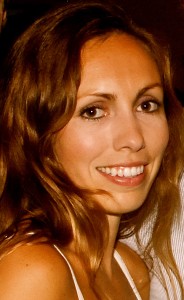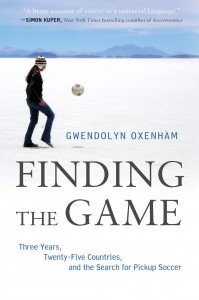In the next installment of our Alumni Interview Series, we got to pick the brain of Gwendolyn Oxenham (’06). Here are her thoughts on her creative process, the best part of her MFA experience, and what she’s been up to since graduating.
1. What sparked your interest in writing?
In third grade our class made pet rocks and wrote stories about them – I’ve loved writing ever since. I was also a huge reader and was always unconsciously imitating whatever I just read. (For example, I once read a book by R.L. Stine about the curse of a camera – whatever the narrator took a picture of then got cursed. I immediately turned around and cranked out “The Curse of the Book,” in which anything the narrator wrote about then got cursed. A fellow third-grader said to me, “Hey, you stole that idea from that R.L. Stine book!” I remember feeling genuinely shocked by his accusation.)
2. Your website shows you’ve worked on essays, novels and films. What current projects are you working on?
I’ve started playing around with fiction, which is a first for me. I’ve spent so much time writing about soccer and it feels pretty great to do something entirely different.
3. What influences your writing? What came first your interest in soccer, or writing?
I think soccer may have narrowly edged out writing. I liked them both for the same reason – the ability to get lost in them. And what’s so cool about soccer is the intimacy it creates. On our trip, once we played with someone, we were no longer American tourists, we were fellow players. We got to know people–from Kenyan moonshine brewers to Iranian women in hijab–in a way we never would have without the game. Their stories were unbelievably inspiring. Currently, my community college and arts students influence me. I have a lot of risk-takers with great stories in my classes and I continually leave my classroom feeling newly amazed by what life has to offer.
4. What was your favorite memory of your MFA experience?
Definitely our inter-mural water polo team. Other fond memories: group dinners (Lisa Gonzales made unbelievable dolmas), long walks through South Bend neighborhoods, coffee at Lulu’s Cafe. Swapping favorite book recs, teasing Matt Ricke for only eating avocados, playing for our spirited-though-winless English department soccer team. Hanging out on Angela and Lisa’s couch and attempting to absorb all their wisdom and know-how. And all-night writing sessions while sitting next to my heater, wearing three sweatshirts, and chugging gas station cappucino.
5. What does your creative process look like?
Hmm. We found an old espresso machine in my mother-in-law’s garage and that thing is key in kick-starting any writing. My best writing is by hand – it feels more like fun and less like work when I’m not staring at a computer screen. Half of the first draft of Finding the Game was written on the beach; the other half was written in the UNC library stacks. (I love college libraries.) Once I am into my second draft, I usually type and revise in a dark room with the door shut. I listen to two or three songs on a nonstop loop. What else…I achieve nothing in the afternoon. The middle of the night is my most creative time…but it’s getting tougher for me to pull all-nighters anymore. To my great astonishment, I’ve become more of a morning writer.
6. Can you elaborate on what the extra year of writing with the Nicholas Sparks fellowship year meant to you?
It was validation– there was the overcoming feeling of “oh my god, someone thinks I could actually be a writer.” It was also the first time in my life where I had the freedom to just sit around and think/dream, follow whims. That free imaginative space led to coming up with the idea for the trip around the world.
7. What advice would you give to writers who want to get into film, or published in general?
Don’t think about the publishing stage – just worry about making something you’re proud of. If you follow something you care about, you will eventually find a way to share it with others. With our film, we drove out to CA to be near our investor. After we drove across the country (hitting a deer on the way), we arrived to discover that our investor could no longer fund the rest of our film. We had nowhere to live, no jobs, no editing equipment, no way to finish our film. But we knew what we had was good and that was enough to push us forward.
8. What is the best piece of advice you’ve received?
To just get out there and see what happens. As for writing advice, Valerie Sayers once told us during a workshop, “Don’t get caught.” You know, trying to get rid of any of the writing that doesn’t ring true, anything that doesn’t seem real. And any part where you yourself are bored while writing it. If you’re unconvinced by a passage, your reader will be too.
9. What is the most exciting highlight of your life since receiving your MFA?
Bribing our way into a Bolivian prison to play pickup soccer with guys serving time for murder – that definitely comes to mind. I also just had a baby, which is a very different kind of exciting. (He has an awesome, all-natural mohawk.) And the most exciting development with my book was having it chosen as Meredith College’s Summer Reading Selection for the incoming freshmen.
10. What are you up to nowadays?
I teach writing classes at Laguna College of Art and Design (LCAD) and Orange Coast College (OCC), I play in pickup games with local Iranian guys, I sing ridiculous songs to my son, and I daydream about my next book.

